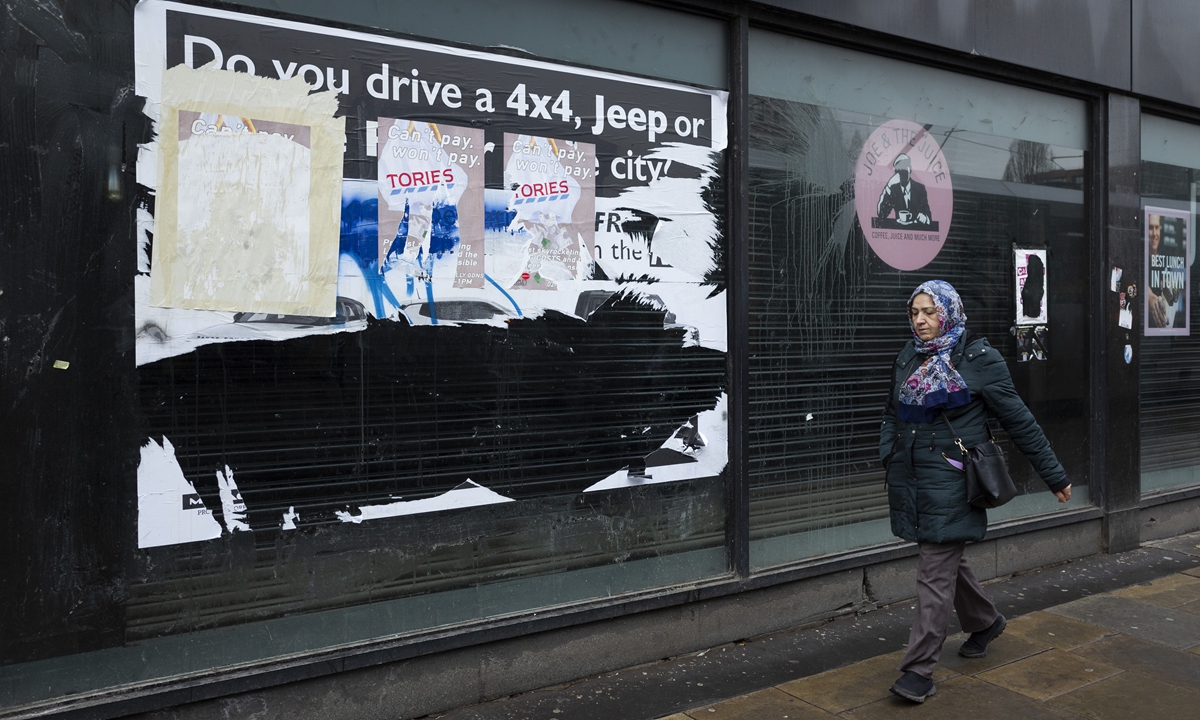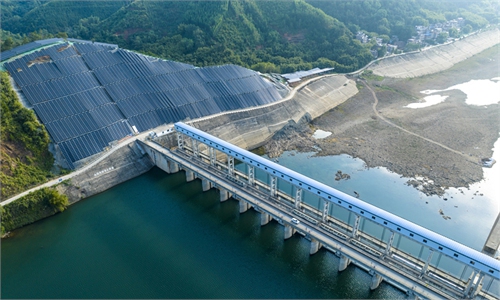
A woman passes torn protest posters in a vacant and neglected shop window on March 30, 2022 in Manchester, UK. Photo: VCG
Editor's Note:The UK, which used to be an empire on which the sun never sets, is experiencing the cost of living crisis, and it is the people who are bearing the brunt of this crisis. Some put candles on now instead of lamps. Some just spend the minimum. In her I-Talk show, Global Times (GT) reporter Wang Wenwen interviewed James Anderson (Anderson), founder of Depher - which stands for Disability and Elderly Plumbing and Heating Emergency Repair that provides free heating services to the elderly and the disabled people, and Michael Burke (Burke), a London-based economist, on their experiences of living under the cost of living crisis.
GT: You set up Depher in 2017 to help people in deprived circumstances suffering from poor heating and plumbing. Compared with 2017, do you help more people now? Why the number of people who need help is more?
Anderson: We have had 80 percent more people who need help than in 2017. The phone never stops. It's going 24 hours a day, 7 days a week. I would say about 80 percent more, easily.
It's getting more and more, and it's not just because the cost of living crisis that we're going through. I think it's just because people now know there is someone there to help them. They now know they don't have to suffer on their own and there is somebody that'll listen, help them and contribute toward it or pay for it.
GT: How do you help people in deprived circumstances? Can you give an example of someone who is deeply affected by the cost of living crisis?
Anderson: We could be walking into a situation where somebody has not had any heating or hot water for a year, two years, three years. We've had a lady without heating or hot water for eight years. And you walk into a situation where they've tried every avenue, so they rang the government, they rang the council, they rang all the charities. They've exhausted every other avenue of help that's out there that they know about. And then up pops Depher and we give them the solution. We don't always give them the answer, but we give them the solution, so they can find the answer. So we don't just remove the problem. We educate them to stop the problem from happening again.
GT: How serious is the energy crisis? As winter comes, what difficulties does the energy crisis bring to the British people to get heating? How do people save electricity?
Anderson: At the moment in time, I'd say it's serious. But it's not as serious as it is going to get if the war does not end and the winter comes. Because that's when people will have no choice. The people will be in a position where they will have to use the boilers, they will have to use the gas, they will have to pay the high prices.
It's going to get bad if the winter is bad. If it's a mild winter, it'll be better. But looking at the weather forecast, we could be looking at a bad winter.
If you have a boiler that runs your heating and your hot water, all you do with them is to turn them down, you turn the usage down, you turn the temperature down. You turn appliances off when you go to bed, you don't use appliances as much during the day. So you reduce your consumption. And that is the only way of saving money and it won't save a hell of a lot of money, but it may get you through the period that we're going through now.
They've never done it before the cost of living crisis because people could afford to run the houses the way they did. And they budgeted, and they had a set plan of what they could spend, where they could spend it and how they could spend it or what they could save. So everybody had a plan and everyone was living happily but obviously since the cost of living crisis has come, especially after the outbreak of COVID pandemic, we got into an unprecedented area where nobody knows, not even the government knows, what's going to happen next. So I think we're all going to be blind, but we need to hold each other's hands and guide ourselves through it as much as we can.
Burke: I wouldn't be anywhere near the most badly hit type of person in Britain. I think the most shocking thing for me is how much energy bills, gas and electricity, how much they've risen over the recent period. They've been more than doubled. And we're going into winter now. No one can tell us for sure how severe the winter will be. I think it's bad for me, so I think it must be desperately worrying for many other people.
My energy bill is getting on for something close to about one-fourth to one-third of my take-home pay. In this country, there's an accepted measure of fuel poverty, which is, if you're spending more than 10 percent of your income on energy costs. Now, by that definition, I have fuel poverty. There's a phenomenon here known as "heat or eat," which means that people have to choose between whether to heat their homes or to feed themselves, but can't afford to do both.
GT: Why couldn't the UK government effectively manage the prices?
Anderson: The UK government can't effectively manage the crisis because it's out of their control, because the companies that are charging these places are doing this because they're private companies, they are not state-owned, they are not owned by the public, they're not owned by the government.
So the government can only cap, the government can only advise. The government can only go so far before the companies reply and turn round and say what we'll charge what we want, we'll do what we like because you don't own us. We will charge what we please. And if the government then starts fining these companies, then these companies will eventually remove themselves from the country, which will have a worse effect on us.
GT: Do you think changing the prime minister could solve the problem?
Anderson: No. I don't think any politician in this country, no matter who they are, no matter what party they are from, will have the answer to the problems that we are facing now. I don't think any of them has got a clue what to do. I don't really think any of them should be in the job that they're in, but that's my personal preference.
Burke: Because the government plays such a direct role in making matters worse, it could just make matters better. It could do the opposite of what's doing. It could have genuine windfall taxes. It could force, by regulation, prices to be lower. It could nationalize the energy companies or at least the parts which operate in this country. All of those things are possible. All of those things happen in other countries. It's all quite easily doable. Banks are making a fortune. The government has just given them a huge subsidy. We have austerity here, which is a big offensive against the living standards of ordinary people.
The British government is quite committed to this project - what I would call an Americanization project. It has a project of lowering living standards, lowering wages, removing lots of powers of trade unions, and privatization. There is a big change taking place. Because it's a big change, the British government has got itself into a mess about how far and how fast to go, but there's no real disagreement about where they want to get to, which is a society or an economy much more like the US than a traditional Western European social, democratic welfare state type model.
GT: Are you disappointed about your country, which used to be an empire on which the sun never sets?
Anderson: The UK was once that way inclined and there's a lot of history within the UK that I am so ashamed of. I really am. But we're now a diverse country, with diverse people from all over the world we're a multicultural country now, and I think together as that multicultural, we can move forward and champion everybody in the whole world to be the same. Don't forget about the past, but learn from it. We can't be that people anymore. We need to be loving. We need to be a community. And I'm hoping that goes forward, we will be there.

